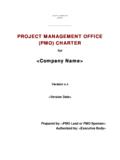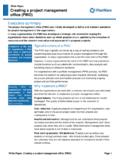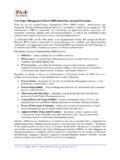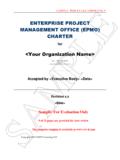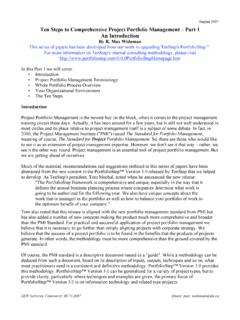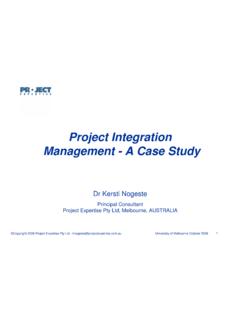Transcription of Project management best practices for ERP upgrades
1 E-Guide Project management best practices for ERP upgrades ERP upgrades are complex and often costly projects. For companies planning an ERP upgrade, strong Project management is key to success. Perfecting a Project management strategy ahead of time is a good way to keep an ERP upgrade on track, avoid common upgrade mistakes and ensure that time and money are not wasted. In this SearchManufacturingERP E-Guide, site experts provide guidance for successfully leading an ERP upgrade Project . Readers will: Get expert advice for developing a sound implementation strategy based on Project - management methodologies Learn how to improve their ERP implementation strategies Find out how to make the case for an ERP upgrade Read best practices and tips to ensure that your ERP upgrade goes smoothly Sponsored By: E-Guide Project management best practices for ERP upgrades Sponsored By.
2 Page 2 of 16 E-Guide Project management best practices for ERP upgrades Table of Contents Project management methodologies can ease ERP software implementation Building a better ERP implementation strategy How to make the case for an ERP upgrade Tips for avoiding common pitfalls of ERP upgrades Resources from IQMS E-Guide Project management best practices for ERP upgrades Sponsored By: Page 3 of 16 Project management methodologies can ease ERP software implementation By David Essex, Site and News Editor ERP software implementation projects are notorious for taking too long, going over budget and failing to deliver.
3 But some manufacturers are having more success by adopting general-purpose Project management methodologies, software tools and techniques that bring discipline and greater predictability to projects of any kind -- IT or otherwise. They ve learned that knowing something about the Project management discipline can make the difference between ERP success and failure. The chief benefit of ERP Project management is how it brings best practices to formulating Project scope and managing change, according to Margo Visitacion, a vice president and analyst at Forrester Research. The reason ERP stumbles and falls as a Project is you don t have the appropriate person doing communication throughout the organization, and you don t have appropriate scope management , Visitacion said.
4 There s a lot of cultural change that comes with ERP. You ve got to have the right stakeholders involved along the way. Scope, time and cost are the three main constraints of any Project , and they are often depicted as corners of a triangle: Change one, and the other two are affected. Philosophies about how to manage the constraints seem as numerous as the ERP software options. What all Project management approaches have in common is a methodical process for bringing ideas to reality through careful planning, design, execution and testing, all documented in ways that encourage stakeholder cooperation and accountability.
5 Above it all is a software-enabled process for controlling and monitoring work so it stays on task, on schedule and under budget. What a PMP knows Most Project managers in North America are certified by the Project management Institute (PMI), receiving the title Project management professional (PMP) after training in the E-Guide Project management best practices for ERP upgrades Sponsored By: Page 4 of 16 Project management Body of Knowledge (PMBOK -- pronounced pimbok ). A competing organization called PRINCE2 dominates certification in the United Kingdom and a few other countries. PMBOK-managed projects have five major phases: initiation, planning, execution, monitoring, and closing.
6 It s a guideline -- it s not a rule, said Sanjay Swarup, an electrical engineer and PMP who chairs the PMI s special-interest group for information systems. The planning stage includes requirements management as well as identifying tasks and estimating their duration. Execution covers system design and deployment and any development required for custom applications or data integration. In the closing phase, the Project manager closes the financial books and handles remaining administrative issues, such as releasing the Project team and specifying the vendor s post-deployment obligations. Requirements management is one of the most important planning steps because it sets the tone for the entire implementation Project .
7 It is very important to record all the requirements very early in the document and have the agreement of the customer, Swarup said. It can have impact on the scope, the schedule, [and] the cost. The process often includes the drafting of a requirements traceability matrix (RTM), a table -- not technically required by the PMBOK -- that shows all Project requirements and documents for their design, planning and testing. Swarup said he has seen ERP projects go off track when requirements were piled into documents that exceeded 200 pages without an associated planning document to show how the requirements were to be executed.
8 Everything is in trouble at that point, Swarup said. Visitacion agreed that poor requirements planning is often where projects go wrong, even at the biggest companies. If you don t alert your users to the cultural changes that are coming along, you re not going to have the right requirements defined, she said. A requirement is not just looking at what you want to do, but how you want to do it. E-Guide Project management best practices for ERP upgrades Sponsored By: Page 5 of 16 Where to get good Project management There s lowercase Project management that everyone says they do, and then there s the more rigorous kind, backed by academic research and methodologies and run by people certified to apply them.
9 Is there a middle ground, a way to bring disciplined Project management to ERP implementations without hiring PMPs? A PMP does not a great Project manager make, Visitacion said, acknowledging the title provides a level of assurance that matters to some companies. A PMP definitely has the knowledge around the practices , but it doesn t necessarily mean they re an experienced Project manager. I wouldn t focus on whether they re a PMP, but whether they have the track record. Some of the best Project managers I know only recently got their PMP. Swarup, whose day job is as Project manager for the global consulting firm, Cap Gemini, claimed PMPs are more committed to maintaining Project discipline.
10 In our company, getting certified is a job requirement, he said. Besides consultants and in-house PMPs, manufacturers can find similar expertise in their ERP vendors, and ERP systems are typically sold with the vendor s implementation methodology. But consultants seem divided on whether the vendor methodologies are adequate, and PMPs say regardless, they don t help to manage multiple, often unrelated projects in portfolios that draw on shared resources. Some companies, especially larger ones, centralize management of all major projects in a Project - management office (PMO). But having a PMO doesn t guarantee the use of formal methodologies and enabling software.
